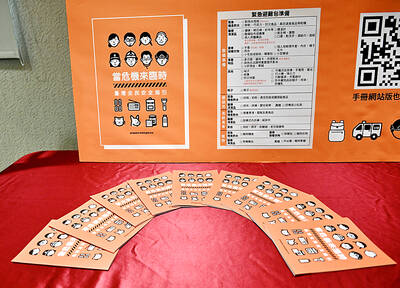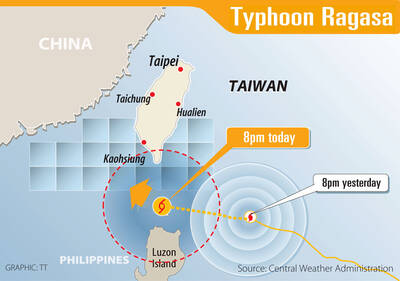Toyota Motor, the world’s top automaker, plans to roll out a fuel-cell car by 2015 in its push to stay ahead in the global race for green autos, vice president Masatami Takimoto said yesterday.
His comments came at a shareholders’ meeting at Toyota headquarters in Aichi Prefecture in response to an investor’s question about the company’s outlook on zero-emissions technology, but he declined to elaborate.
Fuel-cell technology is considered a cutting-edge solution to reducing carbon dioxide emissions as it generates electricity by combining a fuel — usually hydrogen — with oxygen, and therefore only emits water.
Toyota began limited sales of a fuel-cell hybrid vehicle in 2002 in the US and Japan, using technology from its best-selling Prius hybrids.
But carmakers have generally concentrated on implementing the more affordable technology used for hybrids or battery-powered vehicles.
Fuel-cell systems remain costly because of the technology involved and the fact that it is difficult to store enough hydrogen in a vehicle to allow it to travel as far as a conventional car.
Toyota is banking on greener cars to help it out of its current slump.
It fell into the red for the first time in nearly 70 years last fiscal year when it logged an annual net loss of ¥436.9 billion (US$4.4 billion).
It expects an even worse performance in the current business year to March — a net loss of ¥550 billion and an operating loss of ¥850 billion.
Vehicle sales are expected to fall to 6.5 million.
The company plans to expand its line of fuel-sipping hybrids and cut costs as part of efforts to return to profit. Last month it launched its latest Prius, which was also the best-selling car in Japan that month.
Also at the shareholders’ meeting, Akio Toyoda, the grandson of the group’s founder, officially replaced Katsuaki Watanabe as president.
More than 3,300 shareholders packing a hall at Toyota headquarters — a record attendance — showed their approval by applause for the selection of 29 new directors, mostly company executives and directors, including Toyoda.
Toyoda, 53, responded to the worries of a shareholder about the delay in Prius hybrid deliveries because production hasn’t kept up with booming demand, with deliveries not arriving until about November.
“We are very sorry to make customers wait,” he told shareholders, standing at the corner of the stage with other executives.
He assured shareholders everything was being done to boost production.

One of two tropical depressions that formed off Taiwan yesterday morning could turn into a moderate typhoon by the weekend, the Central Weather Administration (CWA) said yesterday. Tropical Depression No. 21 formed at 8am about 1,850km off the southeast coast, CWA forecaster Lee Meng-hsuan (李孟軒) said. The weather system is expected to move northwest as it builds momentum, possibly intensifying this weekend into a typhoon, which would be called Mitag, Lee said. The radius of the storm is expected to reach almost 200km, she said. It is forecast to approach the southeast of Taiwan on Monday next week and pass through the Bashi Channel

The number of Chinese spouses applying for dependent residency as well as long-term residency in Taiwan has decreased, the Mainland Affairs Council said yesterday, adding that the reduction of Chinese spouses staying or living in Taiwan is only one facet reflecting the general decrease in the number of people willing to get married in Taiwan. The number of Chinese spouses applying for dependent residency last year was 7,123, down by 2,931, or 29.15 percent, from the previous year. The same census showed that the number of Chinese spouses applying for long-term residency and receiving approval last year stood at 2,973, down 1,520,

EASING ANXIETY: The new guide includes a section encouraging people to discuss the threat of war with their children and teach them how to recognize disinformation The Ministry of National Defense’s All-Out Defense Mobilization Agency yesterday released its updated civil defense handbook, which defines the types of potential military aggression by an “enemy state” and self-protection tips in such scenarios. The agency has released three editions of the handbook since 2022, covering information from the preparation of go-bags to survival tips during natural disasters and war. Compared with the previous edition, released in 2023, the latest version has a clearer focus on wartime scenarios. It includes a section outlining six types of potential military threats Taiwan could face, including destruction of critical infrastructure and most undersea cables, resulting in

WARNING: People in coastal areas need to beware of heavy swells and strong winds, and those in mountainous areas should brace for heavy rain, the CWA said The Central Weather Administration (CWA) yesterday issued sea and land warnings for Typhoon Ragasa, forecasting that it would continue to intensify and affect the nation the most today and tomorrow. People in Hualien and Taitung counties, and mountainous areas in Yilan and Pingtung counties, should brace for damage caused by extremely heavy rain brought by the typhoon’s outer rim, as it was upgraded to a super typhoon yesterday morning, the CWA said. As of 5:30pm yesterday, the storm’s center was about 630km southeast of Oluanpi (鵝鑾鼻), Taiwan’s southernmost tip, moving northwest at 21kph, and its maximum wind speed had reached